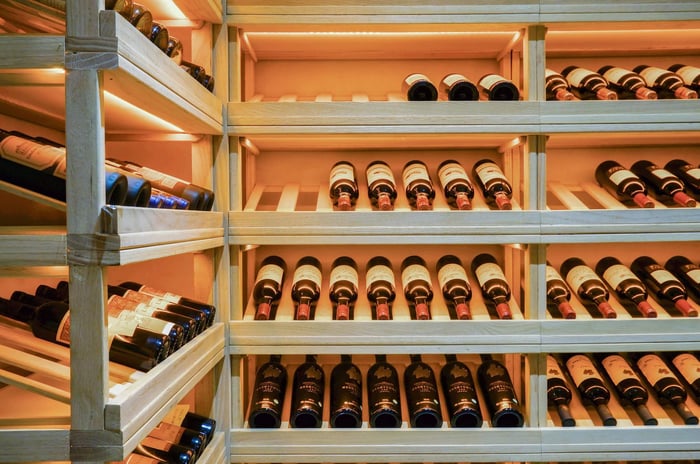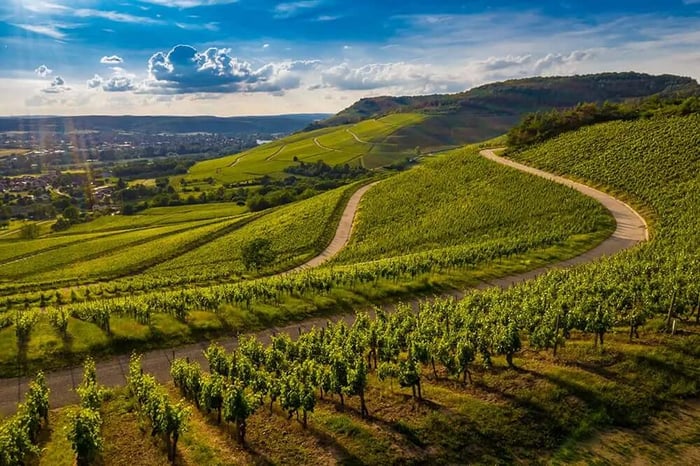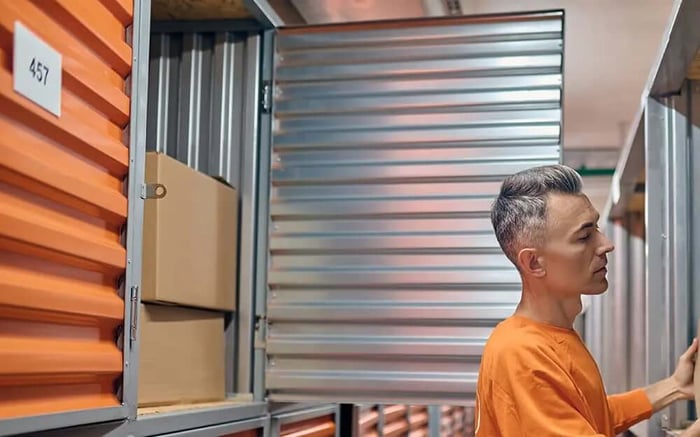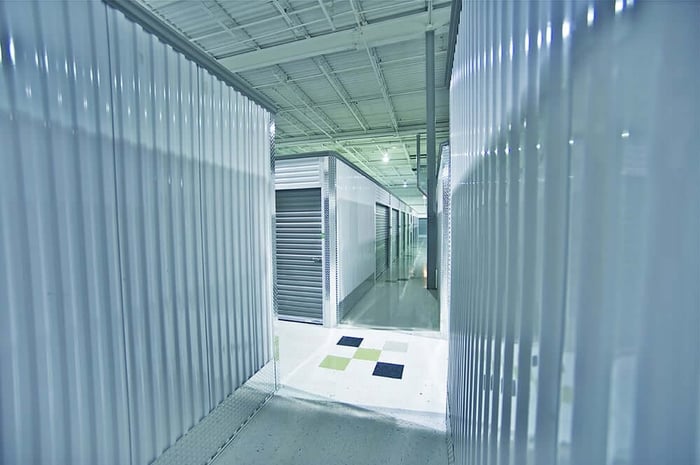Table of Contents
Whether you're a seasoned collector or just enjoy an occasional bottle of white, knowing how to store wine properly is key. Wine evolves over time, so temperature, humidity, and other wine storage factors significantly affect how it tastes when you're ready to uncork a bottle.
Here are some essential tips to help you store your wine like a connoisseur, including how Storage Star can assist you with storing wine.
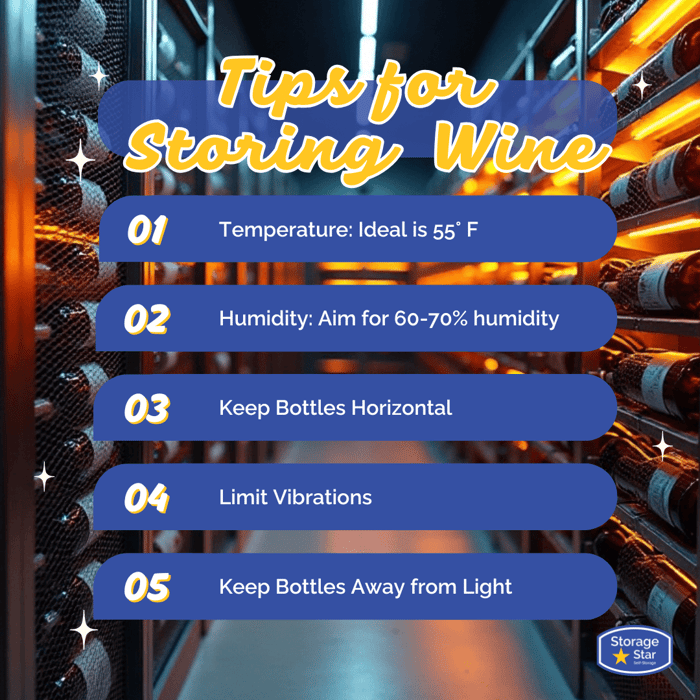
Keep It Cool
The temperature at which you keep your wine can greatly impact its quality and longevity. You want your wine to stay at a consistent temperature, ideally between 45 degrees Fahrenheit and 65 degrees Fahrenheit. 55 degrees Fahrenheit is often considered the best temperature for long-term storage.
Avoid storing wine in places where the temperature fluctuates, such as garages, basements, or kitchen cupboards. Temperature changes can affect the wine's aging process and its flavor.
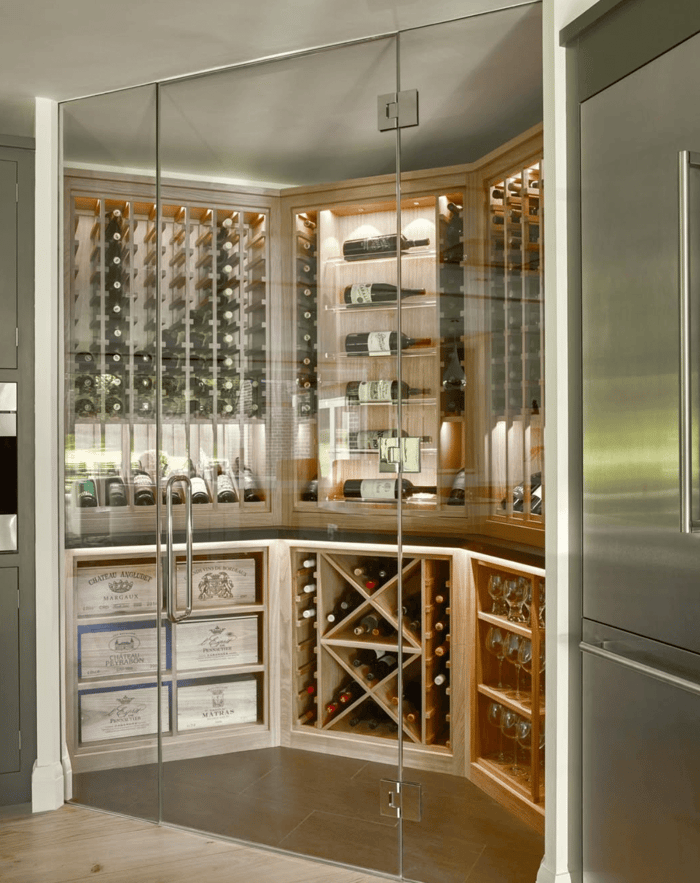
Photo Credit: @highamfurniture
Maintain Proper Humidity
What humidity level is best for storing wine? You want to aim for 60% to 70% humidity.
- Low humidity can dry out corks and let air into bottles
- High humidity can let air into bottles, encouraging mold
A climate-controlled wine storage unit can offer the best balance, helping to protect your investment.
Store Bottles Horizontally
Should you store wine on its side? The answer is yes! Keeping your bottles horizontal helps keep the cork moist, preventing oxidation.
When wine oxidizes, it can lead to an undesirable taste, including loss of freshness and a flattening of the flavors. It can even turn your wine into vinegar. You may also notice your wine changing color, particularly in reds (red wine may go from a purple to a brown tone). If you enjoy orange wines or oloroso sherry, oxidation is good, but it is not for your staple reds and whites.
Plus, this is a more space-efficient way to organize your collection. We recommend storing your bottles in dedicated wine racks, even in self-storage units.
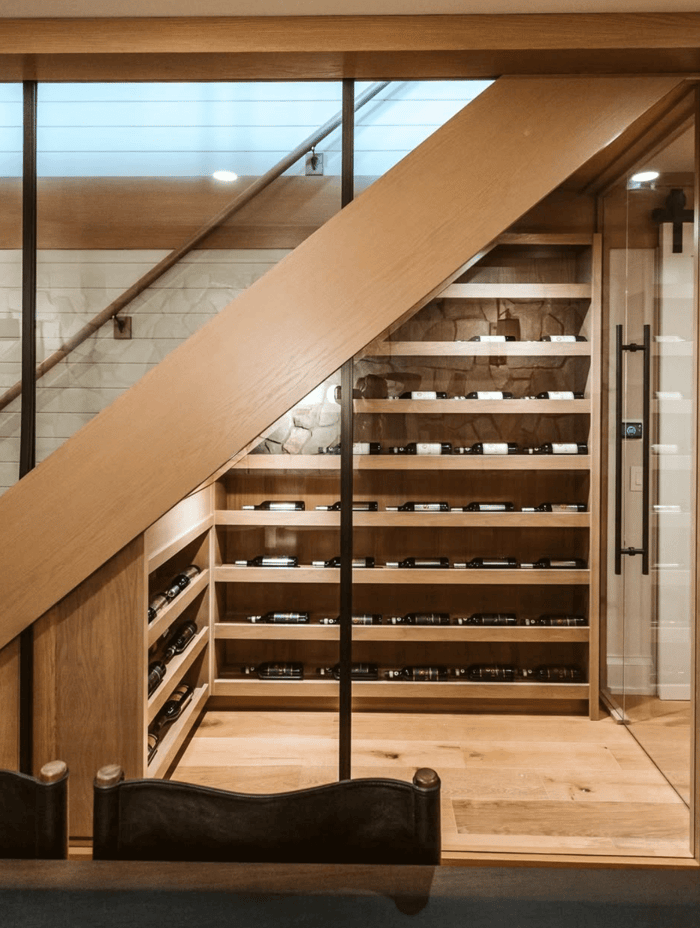
Photo Credit: @elitedesigns_int
Keep Bottles Away from Light
Simply put: UV light is not suitable for wine. Wine can age too quickly or lose flavor when exposed to sunlight or harsh indoor lighting.
The best way to store wine is in a dark space or a wine storage unit designed to minimize light exposure.
Limit Vibrations
Constant vibrations can disturb sediments in wine, affecting flavor, particularly for reds and aged bottles. When stored near appliances or high-traffic areas, your wine can be exposed to constant vibrations.
Quiet, stable environments are the best for wine storage and longevity.
Age the Right Wines
Are you saving all those great whites you got on your Italian honeymoon? Consider cracking them open if it has been a few years since your travels.
Not all wines will benefit from long-term storage. Many whites and everyday reds should be enjoyed within a few years. Before you store your bottles, you can just research your wine's ideal aging window to avoid future disappointment.
Some expert tips on how long to store unopened wine?
- White Wines: Table whites are best within 1 to 2 years of bottling
- Rieslings: Dry Rieslings can be enjoyable for 5 to 15 years, while semi-sweet and fully sweet can age well for 10 to 30 years.
- Cabernet Sauvignon: Napa Valley varietals taste best between 8 and 30 years
- Cooking Wines: 3 and 5 years
- Sparkling Wines: 3 years, but carbonation can diminish over time
- Fortified Wines: Your ports, sherries, and madeiras have higher alcohol content, so they can be enjoyed for a long time, potentially 20 years
- Rosé: Rosé has a shorter shelf life, typically losing freshness after 1.5 years
- Chiantis: Depending on the aging process, a Chianti's lifespan can vary greatly. Young Chiantis should be opened soon after purchase, while Chiantis aged for 2+ years can still be good between 10 to 15 years after bottling.
There are many different storage length recommendations online, so if you're still unsure, it's best to go to the source. Consult with a sommelier or wine professional at a local vineyard or wine shop.
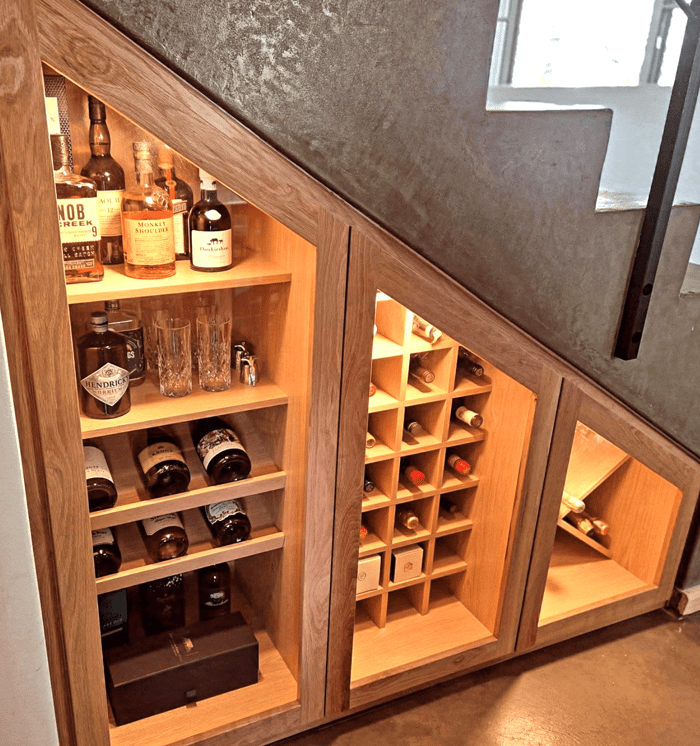
Photo Credit: @ourhouseretro
Keep Wine Away from Odors
Do not store your wine in a pantry! Wine breathes through its cork, and strong odors can affect flavor over time. Keep your wines away from cleaning products, chemicals, and strong-smelling foods and spices. If possible, store wine in a completely odor-free environment.
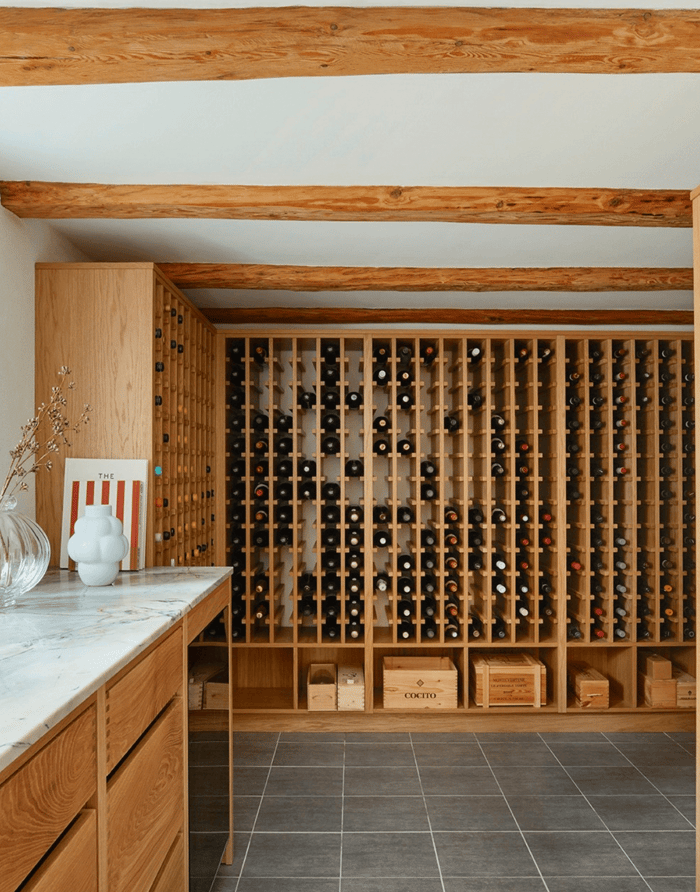
Photo Credit: @handcraftedinterior
Use Climate-Controlled Storage
Many people store wine in their basements and garages because they don't have the extra space to store their bottles or collections, and most of us don't even have the right conditions at home for wine storage.
Renting a climate-controlled wine storage unit near you is a smart move. Specialized wine storage lockers offer optimal temperature and humidity levels, which is excellent for long- and short-term storage. It's also a great option for storing wine for special occasions, investment, or future consumption.
Can You Store Champagne in Climate-Controlled Storage?
The answer is yes! Like other sparkling wines, champagne is also sensitive to temperature, humidity, light, and vibrations.
At Storage Star, many of our facilities offer special lockers and climate-controlled storage units designed to help preserve your wine collection. Whether you casually collect bottles on your travels or are a serious wine aficionado, our secure, climate-controlled storage units protect your bottles from heat, humidity, and light.
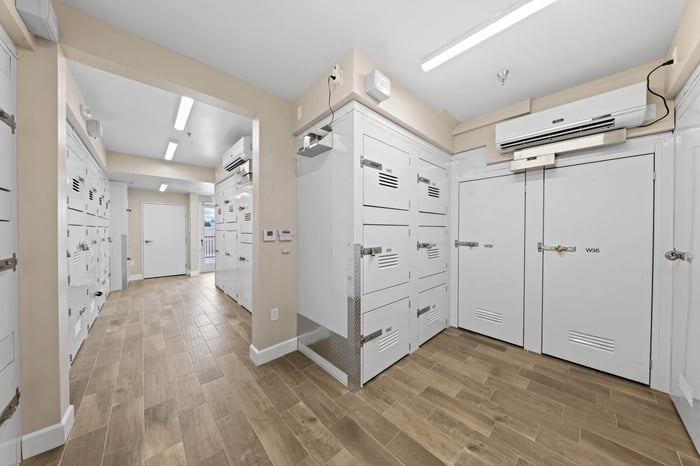
With convenient access, top-tier security, flexible leases, and many unit sizes, we make it easy to store your wine (and anything else you need storage for!). To get started on storing your wine in a wine locker or climate-controlled storage unit, you can rent now online! Some of our featured wine locker locations include:
- Storage Star Napa at 400 Devlin Road
- Storage Star Sacramento at 3301 S Street
FAQs
Can I store whiskey in climate-controlled storage?
Yes, you can store whiskey in a climate-controlled storage unit. It is recommended to keep whiskey at a constant temperature, between 60 and 65° F, and out of sunlight. Unlike wine bottles, though, you should keep your whiskey bottles upright!
Can I store rum in climate-controlled storage?
Rum can be stored in a climate-controlled unit. Rum should be stored somewhere cool, dark, and out of high humidity.
Should I store my wine bottles on shelves?
We recommend storing your wine collection on shelves, which'll help you maximize space! Remember to store your wine bottles horizontally when using shelves.
What temperature should I store champagne at?
Champagne should be stored at a consistently cool temperature, ideal between 53 ° F and 57° F. Humidity isn't as crucial for champagne, but you still want to store champagne bottles at a relative humidity of 60-80%.
Should I store open wine in a self-storage unit?
Our answer is no. The reason is that opened bottles of wine do not last long, typically 3-5 days. If you're not visiting your storage unit on the daily, there's a chance your opened bottle of wine will be bad by the time you get to it. We recommend storing opened bottles of wine at home. Invest in a vacuum pump to help limit the amount of oxygen in the bottle. This will help with lifespan!
What is the best type of self-storage for wine?
Climate controlled! We do not recommend a non-climate-controlled unit because there can be too many fluctuations in temperature and humidity that will end up impacting the wine's quality.
